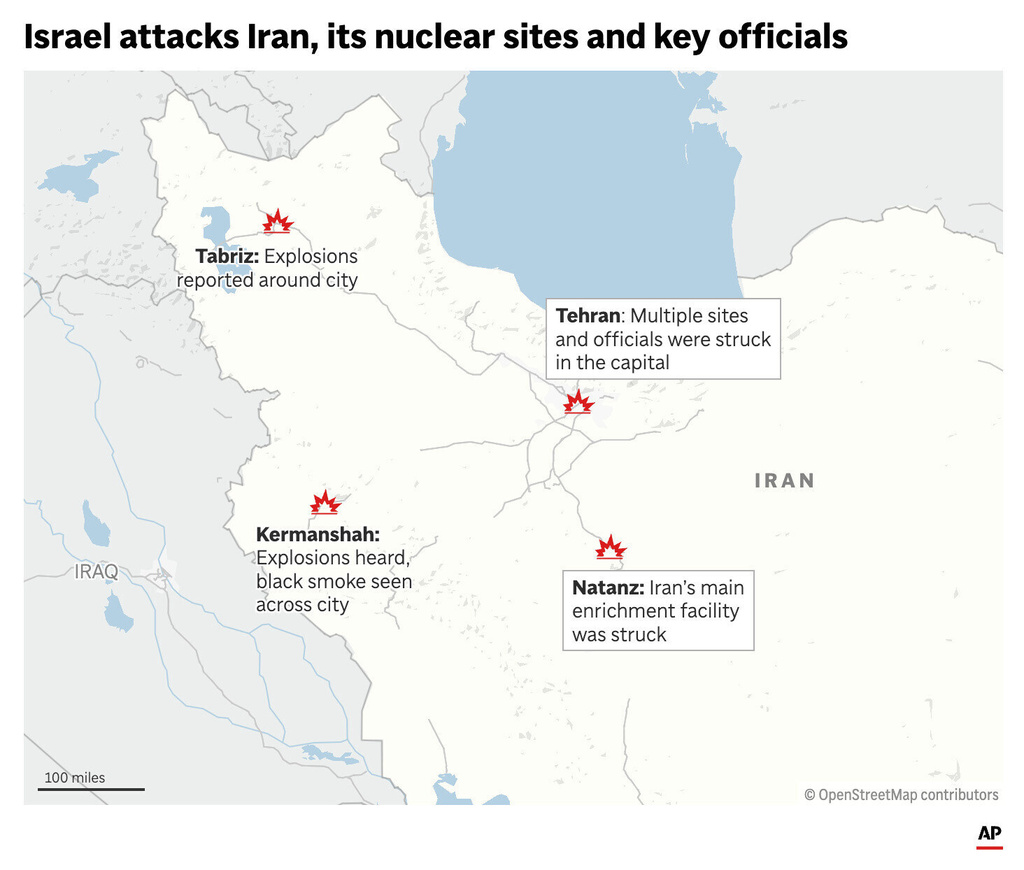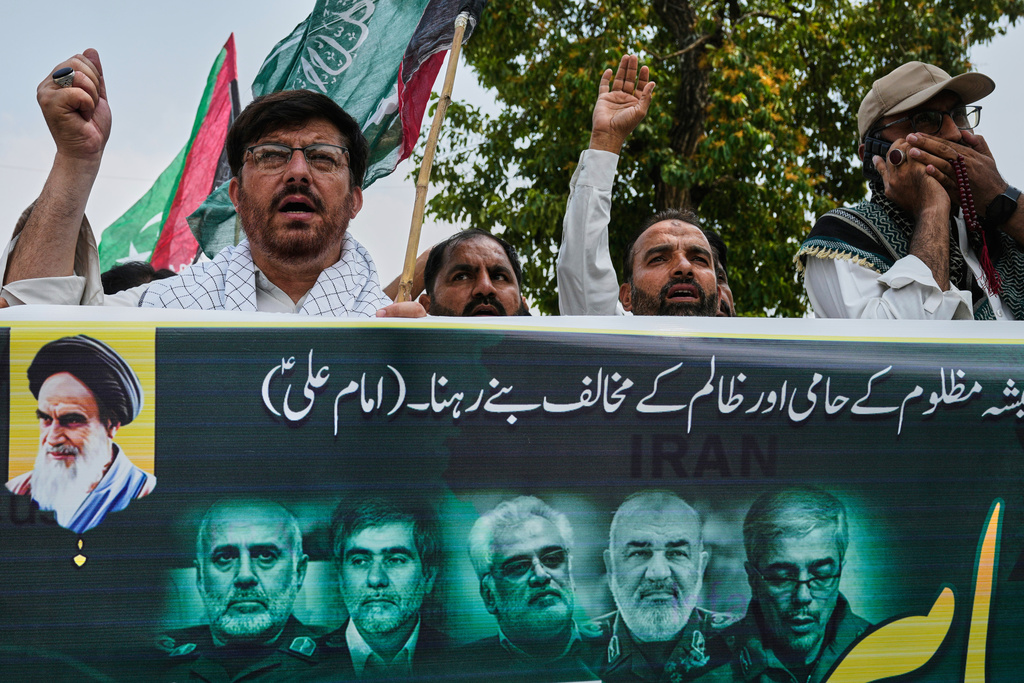President Donald Trump again urges Iran to reach a nuclear deal with US, warning attacks 'will only get worse!'
JERUSALEM (AP) — Israel launched a major attack on Iran Friday, drawing their long-running shadow war into open conflict in a way that could spiral into a wider, more dangerous regional war.
The strikes set off explosions in the capital of Tehran as Israel said it was targeting Iranian nuclear and military facilities. Among those killed were three of Iran’s top military leaders, one who oversaw the entire armed forces, Gen. Mohammad Bagheri, one who led the paramilitary Revolutionary Guard, Gen. Hossein Salami, and another who ran the Guard’s ballistic missile program, Gen. Amir Ali Hajizadeh. Two top nuclear scientists also had been killed. Israel said it killed additional Revolutionary Guard members.
Israel said Iran retaliated by sending over 100 drones toward Israel, most of which were intercepted. As of Friday afternoon, the military said strikes in Iran were ongoing.
Like other guard leaders, Salami routinely delivered speeches with harsh rhetoric towards Israel. In a 2016 speech he said there was “fertile ground” for the “annihilation, the wiping out, and the collapse of the Zionist regime”.
He also threatened the United States.
After the U.S. killed the powerful head of the guard's Quds Force, Qassem Soleimani, in a drone strike outside Baghdad's airport in 2020, Salami threatened to retaliate against American and Israeli commanders. The Quds, or Jerusalem, Force is an elite wing of the Guard that oversees foreign operations.
Five days later, Iran launched ballistic missiles at two bases in Iraq housing American troops, causing injuries but no fatalities among soldiers there.
Israel's attack comes as tensions have escalated over Iran’s rapidly advancing nuclear program, which Israel sees as a threat to its existence.
Talks ineffective
The Trump administration revived efforts to negotiate limits on Iran’s uranium enrichment in exchange for the lifting of economic sanctions. But the indirect talks between American and Iranian diplomats have hit a stalemate.
The attack pushed the region into a new and uncertain phase. Here's what to know about the strikes:
Israel hit nuclear sites, killed Revolutionary Guard chief
Israeli leaders said the attack was aimed at preventing Iran from acquiring a nuclear bomb as the country enriches uranium a short, technical step away from weapons-grade levels. Iran long has said its program is peaceful and U.S. intelligence agencies have assessed Iran was not actively building a weapon.
In a video announcing the military operation, Israeli Prime Minister Benjamin Netanyahu said the strikes hit Iran's main enrichment site, the Natanz atomic facility, and targeted Iran's leading nuclear scientists. He said that Israel had also targeted Iran's ballistic missile arsenal.
An Israeli military official, who was speaking on condition of anonymity in line with regulations, said that Israel was continuing to strike Iran but declined to say in which locations.
Iranian state television and the semi-official Fars news agency both carried news of Israel striking Iran's nuclear enrichment site in Natanz. State TV also reported attacks in Shiraz and Tabriz.

Iran retaliates with drones, but Israel says it deflected threat
In retaliation, Iran launched over 100 drones toward Israel.
Israel’s military said its air defenses had shot down most of the drones and told civilians they could leave shelters for the time being. But the military said the threat was not yet over and urged caution. It closed Israeli airspace and said it was calling up tens of thousands of soldiers to protect the country’s borders.
Iran’s President Masoud Pezeshkian says his nation would “strongly take action” against Israel after its attacks on the country.
From Washington, U.S. President Donald Trump urged Iran to reach a deal with the U.S. on its nuclear program, warning that Israel’s attacks “will only get worse." He previously said that the U.S. had not been involved in the attack.

Israel's air force and spy agency carried out the operation
An Israeli military official said around 200 aircraft took off at the same time to conduct operations over 2,000 kilometers (1,200 miles) away in Iran, targeting air defense systems, ballistic missile manufacturing sites and missiles ready to be launched toward Israel. The official said dozens of radar installations and surface-to-air missiles were destroyed.
Also involved in the operation was Israel's spy agency, the Mossad. Israeli security officials said the Mossad smuggled weapons into Iran ahead of Friday’s strikes that were used to target its defenses from within.
Two security officials spoke on condition of anonymity on Friday to discuss the highly secretive missions. It was not possible to independently confirm their claims.
The officials said a base for launching explosive drones was established inside Iran and that the drones were activated during Friday’s attack to target missile launchers at an Iranian base near Tehran.
They said Israel had also smuggled precision weapons into central Iran and positioned them near surface-to-air missile systems. They said it also deployed strike systems on vehicles. Both were activated as the attacks began in order to target Iran’s defenses, the officials said. There was no official comment.
Unclear how close Iran is to building a bomb
Netanyahu claimed Friday that if Iran wasn't stopped, "it could produce a nuclear weapon within a very short time.” But it likely would take Iran months to build a weapon, should it choose to do so. It also hasn’t proved its ability to miniaturize a bomb to be placed atop missiles.
Iranian officials have openly threatened to pursue the bomb. Tensions over Iran's rapid nuclear advances and growing reserves of highly enriched uranium are surging seven years after President Donald Trump unilaterally withdrew the U.S. from Tehran’s 2015 nuclear deal with world powers.
For the first time in two decades, the atomic watchdog agency on Thursday censured Iran for failing to comply with nuclear nonproliferation obligations meant to prevent it from developing a nuclear weapon.
In response, Iran said that it would open a previously undisclosed enrichment site and accelerate production of 60% highly enriched uranium, which could be easily processed to the 90% level used in nuclear weapons.
Israeli military said it hit ‘underground command center’
The Israeli military said military jets hit a site where Revolutionary Guard officials had “assembled in an underground command center,” allegedly “to prepare for an attack on the state of Israel,” and killed Gen. Amir Ali Hajizadeh along with two other senior officials.
It did not offer details or information to support the claim.
“Hajizadeh publicly declared his commitment to Israel’s destruction at various events in recent years and played a central role in developing the Iranian regime’s plan for Israel’s destruction,” the Israelis said.
It also linked those killed to an attack on Saudi Arabia in 2019.
Iran’s president warns of strong action against Israel
Iran’s President Masoud Pezeshkian says his nation would “strongly take action” against Israel after its attacks on the country.
In a televised address Friday, Pezeshkian urged people to unite behind its theocratic government.
The “Islamic Republic of Iran will give a severe, wise and strong answer to the occupier regime,” he said, referring to Israel.
Iran says nuclear enrichment facility was damaged
Iran’s Atomic Energy Organization said in a statement that parts of the Natanz nuclear enrichment facility were damaged during the Israeli strikes but that no nuclear radiation or chemical contamination has occurred.
Israel’s defense minister threatens further attacks against Iran
In a statement soon after Israel’s military said it had completed the attack on Iran, Israeli Defense Minister Israel Katz said the military would “continue its activities to thwart the Iranian nuclear program and remove threats on the State of Israel.
“The precise hit on the heads of the commanders of the Revolutionary Guards, the Iranian army and the nuclear scientists, who were all involved in promoting the plan to destroy Israel, is a strong and clear message — those who work to destroy Israel will be eliminated.”
Israeli military says widespread attack on Iranian air defenses complete
The Israeli military says it has completed a widespread attack on air defenses in western Iran.
It said Friday that it had destroyed dozens of radar installations and surface-to-air missile launchers.
Iranian drones tracked crossing Iraq’s airspace
Two Iraqi security officials who spoke on condition of anonymity because of the sensitivity of the situation, said that more than 100 drones launched from Iran toward Israel were tracked crossing Iraqi airspace.
Residents of Iraq’s Diyala province, which borders Iran, reported hearing the sound of aircraft and explosions from strikes inside Iranian territory early Friday.
Some later said they saw drones launched from Iran heading toward Israel.
Israel says it is intercepting Iranian drones
Israel’s military says it has begun intercepting Iranian drones.
Earlier, the military said Iran had launched more than 100 drones at Israel in retaliation for strikes on Tehran and other cities.
An Israeli official said the interceptions are taking place outside of Israeli territory, but did not elaborate.
The official spoke on condition of anonymity pending a formal announcement.
Jordan says strikes push region into more tension
Jordan’s state media says the country’s foreign minister has discussed Israel’s strikes on Iran with his Egyptian counterpart, and warned that the attack pushes the region into more tension and conflict.
Jordan News Agency said the ministers called the strikes a “dangerous escalation and a flagrant violation of international law.”
The ministers also said Israel’s attacks on the Gaza Strip should stop to and a two-state solution is needed to achieve peace and stability in the Middle East.
Egypt and Jordan are among Arab countries that signed peace treaties with Israel and have normal relations with it.
EU’s top diplomat calls for de-escalation in the Middle East
European Commission President Ursula von der Leyen has called the fresh outbreak of violence in the Middle East “deeply alarming.”
“Europe urges all parties to exercise maximum restraint, de-escalate immediately and refrain from retaliation. A diplomatic resolution is now more urgent than ever, for the sake of the region’s stability and global security,” she said in a post on the Bluesky social media platform.
Iran names replacements for commanders killed in strikes
Iran’s supreme leader, Ayatollah Ali Khamenei, has replaced two top military commanders killed in a wave of Israeli strikes on Friday.
State TV said he tapped Gen. Abdolrahim Mousavi as the new head of the armed forces, replacing Gen. Mohammad Bagheri. Mousavi was previously the top army commander.
Khamenei chose Mohammad Pakpour to lead the paramilitary Revolutionary Guard, replacing Gen. Hossein Salami.
Iran’s Revolutionary Guard, created after its 1979 Islamic Revolution, is one of the main power centers within the country’s theocracy.
Israeli officials say they smuggled weapons into Iran ahead of strikes
Israeli security officials say the country’s Mossad spy agency smuggled weapons into Iran ahead of Friday’s strikes that were used to target its defenses from within.
Two security officials spoke on condition of anonymity on Friday to discuss the highly secretive missions. It was not possible to independently confirm their claims. There was no official comment.
The officials said a base for launching explosive drones was established inside Iran and that the drones were activated during Friday’s attack to target missile launchers at an Iranian base near Tehran.
They said Israel had also smuggled precision weapons into central Iran and positioned them near surface-to-air missile systems. They said it also deployed strike systems on vehicles. Both were activated as the strikes began, in order to target Iran’s defenses, the officials said.
--By Josef Federman and Julia Frankel
